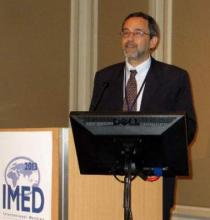“We were lucky,” said Dr. Tomori. “We would have had a much bigger problem if the patient had gone to a teaching hospital.”
On Oct. 20, the WHO declared Nigeria Ebola free.
Ebola also spread this year in the Democratic Republic of Congo (DRC) starting in August, an outbreak documented as unrelated to the one in west Africa and resulting from a DRC resident eating Ebola-carrying bushmeat. In the DRC, a quick and thorough response contained the spread and appears to have brought the outbreak to an end. On Nov. 15, the DRC’s minister of health said that the outbreak was over.
The experience this year in both Nigeria and the DRC shows that “Ebola is completely preventable if you educate people on how to avoid it,” said William Karesh, D.V.M., executive vice president for health and policy at the EcoHealth Alliance in New York.
Prospects for the west African outbreak
Given Ebola’s spread now in west Africa, “it is incredibly daunting to isolate all the cases,” said Dr. Lawrence C. Madoff, a professor of medicine at the University of Massachusetts in Worcester and director of epidemiology and immunization at the Massachusetts Department of Public Health in Boston. “The infrastructure [in the affected west African countries] is missing, challenged, or stretched way too thin, and it’s been incredibly difficult,” but he added that eventually he expects the epidemic curve of Ebola to peak and fall.
“As a rule, outbreaks end, and I don’t see any reason why this outbreak won’t also end. Sometimes, like in the great plagues of the Middle Ages, they can go on for a long time and involve many people, but eventually they do end.”
Dr. Duse agreed, and cited Ebola’s high mortality rate as a factor that limits the duration of outbreaks. “There has never been an Ebola outbreak that was sustained,” he noted.
“Humans are not Ebola carriers; they either die or recover, and stop shedding virus and are immune,” noted Dr. Karesh. But even when the current outbreak in west Africa ends, the threat remains of new introductions of Ebola into people from the reservoirs of virus that exist in bats and primates. “By the time the west African outbreak is controlled, there could be other spillover events” from animals to people, he cautioned.
Dr. Duse, Dr. de Clerck, Dr. Tomori, Dr. Karesh, and Dr. Madoff had no disclosures.
On Twitter @mitchelzoler


